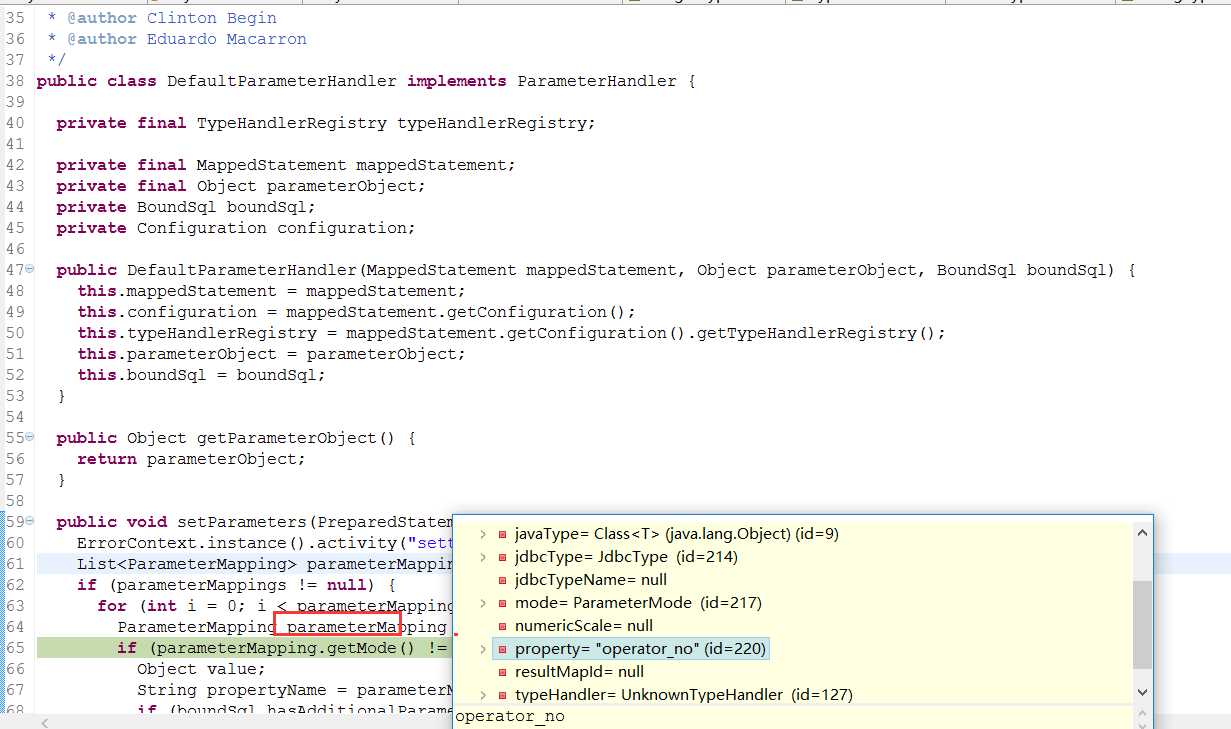标签:java getc set .com nbsp etl slf4j 公司 rri
最近,在测试迁移公司的交易客户端连接到自主研发的中间件时,调用DAO层时,发现有些参数并没有传递,而在mapper里面是通过parameterMap传递的,因为有些参数为null,这就导致了参数传递到数据库的时候也是null,进而导致出错。因为我们公司的业务代码是通过类似一种模板的方式封装的,所以一开始调整了生成代码的模板,使得null在业务代码中一传入的时候进行判断赋值。可技术总监死都不同意,有些时候政治权力是很强大的,很多结果并不是因为最佳合理或者优化而选择,也并不总是成本最低的方案会被选择,这其中会涉及很多的因素,可能是面子问题、影响力等等,终归一句话就是必须在中间件处理掉,不能对现有的业务代码有任何的变动,很明智的我就从了。
因为所有的业务都在存储过程中处理,决定在DAO层进行处理,我们知道,mybatis在处理参数和返回值,对于特定类型都会选择特定的类型处理器以便进行恰当的转换,只不过在大部分的场景中,默认值的处理方式已经足够,所以真正生产中需要进行自定义类型处理的还真不多,通常更多的是为了处理兼容性或者适配性的问题,亦或是某些特殊的持久化实现需要对接。
默认情况下,mybatis提供了几乎所有内置类型的typehandler,在org.apache.ibatis.type包中,如下:

其中,TypeHandler接口是一个回调接口,所有的内置和自定义类型处理器均要实现该接口。
/** * @author Clinton Begin */ public interface TypeHandler<T> { void setParameter(PreparedStatement ps, int i, T parameter, JdbcType jdbcType) throws SQLException; T getResult(ResultSet rs, String columnName) throws SQLException; T getResult(ResultSet rs, int columnIndex) throws SQLException; T getResult(CallableStatement cs, int columnIndex) throws SQLException; }
和其他框架如spring/netty等一样,mybatis也提供了绝大部分常见场景的默认实现以及一个模板类BaseTypeHandler(一般用户自定义的时候都应该继承或者重新实现该类)。
/* * Copyright 2009-2012 the original author or authors. * * Licensed under the Apache License, Version 2.0 (the "License"); * you may not use this file except in compliance with the License. * You may obtain a copy of the License at * * http://www.apache.org/licenses/LICENSE-2.0 * * Unless required by applicable law or agreed to in writing, software * distributed under the License is distributed on an "AS IS" BASIS, * WITHOUT WARRANTIES OR CONDITIONS OF ANY KIND, either express or implied. * See the License for the specific language governing permissions and * limitations under the License. */ package org.apache.ibatis.type; import java.sql.CallableStatement; import java.sql.PreparedStatement; import java.sql.ResultSet; import java.sql.SQLException; import org.apache.ibatis.session.Configuration; /** * @author Clinton Begin * @author Simone Tripodi */ public abstract class BaseTypeHandler<T> extends TypeReference<T> implements TypeHandler<T> { protected Configuration configuration; public void setConfiguration(Configuration c) { this.configuration = c; } public void setParameter(PreparedStatement ps, int i, T parameter, JdbcType jdbcType) throws SQLException { if (parameter == null) { if (jdbcType == null) { throw new TypeException("JDBC requires that the JdbcType must be specified for all nullable parameters."); } try { ps.setNull(i, jdbcType.TYPE_CODE); } catch (SQLException e) { throw new TypeException("Error setting null for parameter #" + i + " with JdbcType " + jdbcType + " . " + "Try setting a different JdbcType for this parameter or a different jdbcTypeForNull configuration property. " + "Cause: " + e, e); } } else { setNonNullParameter(ps, i, parameter, jdbcType); } } public T getResult(ResultSet rs, String columnName) throws SQLException { T result = getNullableResult(rs, columnName); if (rs.wasNull()) { return null; } else { return result; } } public T getResult(ResultSet rs, int columnIndex) throws SQLException { T result = getNullableResult(rs, columnIndex); if (rs.wasNull()) { return null; } else { return result; } } public T getResult(CallableStatement cs, int columnIndex) throws SQLException { T result = getNullableResult(cs, columnIndex); if (cs.wasNull()) { return null; } else { return result; } } public abstract void setNonNullParameter(PreparedStatement ps, int i, T parameter, JdbcType jdbcType) throws SQLException; public abstract T getNullableResult(ResultSet rs, String columnName) throws SQLException; public abstract T getNullableResult(ResultSet rs, int columnIndex) throws SQLException; public abstract T getNullableResult(CallableStatement cs, int columnIndex) throws SQLException; }
下面,来简单介绍下自定义TypeHandler。总的来说,为特定的jdbcType/javaType选择TypeHandler时,有两个层面:
<configuration>
<typeHandlers>
<typeHandler jdbcType="VARCHAR" handler="com.ld.net.core.typehandler.LdStringTypeHandler"/>
</typeHandlers>
</typeHandlers>
这两种场景其实都是有的,前者主要用于一些特殊类型字段的处理,比如clob/json类型等等。后者一般用于框架层面居多。
实现LdStringTypeHandler一般来说继承BaseTypeHandler或者内置的具体实现比如StringTypeHandler。
/* * Copyright 2009-2012 the original author or authors. * * Licensed under the Apache License, Version 2.0 (the "License"); * you may not use this file except in compliance with the License. * You may obtain a copy of the License at * * http://www.apache.org/licenses/LICENSE-2.0 * * Unless required by applicable law or agreed to in writing, software * distributed under the License is distributed on an "AS IS" BASIS, * WITHOUT WARRANTIES OR CONDITIONS OF ANY KIND, either express or implied. * See the License for the specific language governing permissions and * limitations under the License. */ package org.apache.ibatis.type; import java.sql.CallableStatement; import java.sql.PreparedStatement; import java.sql.ResultSet; import java.sql.SQLException; /** * @author Clinton Begin */ public class StringTypeHandler extends BaseTypeHandler<String> { @Override public void setNonNullParameter(PreparedStatement ps, int i, String parameter, JdbcType jdbcType) throws SQLException { ps.setString(i, parameter); } @Override public String getNullableResult(ResultSet rs, String columnName) throws SQLException { return rs.getString(columnName); } @Override public String getNullableResult(ResultSet rs, int columnIndex) throws SQLException { return rs.getString(columnIndex); } @Override public String getNullableResult(CallableStatement cs, int columnIndex) throws SQLException { return cs.getString(columnIndex); } }
内置的默认实现仅实现了setNonNullParameter并没有setParameter,所以,如果我们需要为null赋默认值的话,则需要实现setParameter方法,例如:
package com.ld.net.core.typehandler; import java.sql.PreparedStatement; import java.sql.SQLException; import org.apache.commons.lang.StringUtils; import org.apache.ibatis.type.JdbcType; import org.apache.ibatis.type.StringTypeHandler; import org.slf4j.Logger; import org.slf4j.LoggerFactory; public class LdStringTypeHandler extends StringTypeHandler { static Logger logger = LoggerFactory.getLogger(LdStringTypeHandler.class); public void setParameter(PreparedStatement ps, int i, String parameter, JdbcType jdbcType) throws SQLException { logger.debug(getClass().getCanonicalName() + ".setParameter"); ps.setString(i, StringUtils.isEmpty(parameter) ? " " : parameter); } }
一般来说,这样配置好之后,理论上就可以了,但是测试的时候,笔者发现当参数为null的时候,mybatis死活没有调用设置的LdStringTypeHandler,而是进入了内置的BaseTypeHandler。测试了N次,参数不为null的时候,自定义的typeHander都是有效的。所以最后选择了从mybatis源码拉出BaseTypeHandler,覆盖实现为如下:
import java.math.BigDecimal; import java.sql.CallableStatement; import java.sql.PreparedStatement; import java.sql.ResultSet; import java.sql.SQLException; import org.apache.commons.lang.StringUtils; import org.apache.ibatis.session.Configuration; /** * @author Clinton Begin * @author Simone Tripodi * @author zhjh256@163.com */ public abstract class BaseTypeHandler<T> extends TypeReference<T> implements TypeHandler<T> { protected Configuration configuration; public void setConfiguration(Configuration c) { this.configuration = c; } public void setParameter(PreparedStatement ps, int i, T parameter, JdbcType jdbcType) throws SQLException { if (parameter == null) { if (jdbcType == null) { throw new TypeException("JDBC requires that the JdbcType must be specified for all nullable parameters."); } try { switch(jdbcType) { case INTEGER: ps.setInt(i, (Integer) (parameter == null ? 0 : parameter)); break; case BIGINT: ps.setLong(i, (Long) (parameter == null ? 0L : parameter)); break; case DECIMAL: case NUMERIC: case DOUBLE: case FLOAT: ps.setBigDecimal(i, (BigDecimal) (parameter == null ? new BigDecimal("0.0") : parameter)); break; case VARCHAR: case NVARCHAR: ps.setString(i, (String) (StringUtils.isEmpty((String) parameter) ? " " : parameter)); break; default: ps.setNull(i, jdbcType.TYPE_CODE); break; } } catch (SQLException e) { throw new TypeException("Error setting null for parameter #" + i + " with JdbcType " + jdbcType + " . " + "Try setting a different JdbcType for this parameter or a different jdbcTypeForNull configuration property. " + "Cause: " + e, e); } } else { setNonNullParameter(ps, i, parameter, jdbcType); } }
我们只是覆盖了我们规定的类型,其他的可以自定决定。并删除了mybatis-config.xml中的TypeHandler之后,参数已经如期的传递了默认值。
跟踪期间发现,如果需要根据参数名进行判断,也是可以做到的,只不过不在TypeHandler中,而是在org.apache.ibatis.scripting.defaults.DefaultParameterHandler中。如下:


在这里,所有的参数值就都可以精确进行控制了。
mybatis 3的TypeHandler解析(null值的处理)
标签:java getc set .com nbsp etl slf4j 公司 rri
原文地址:http://www.cnblogs.com/zhjh256/p/6182883.html